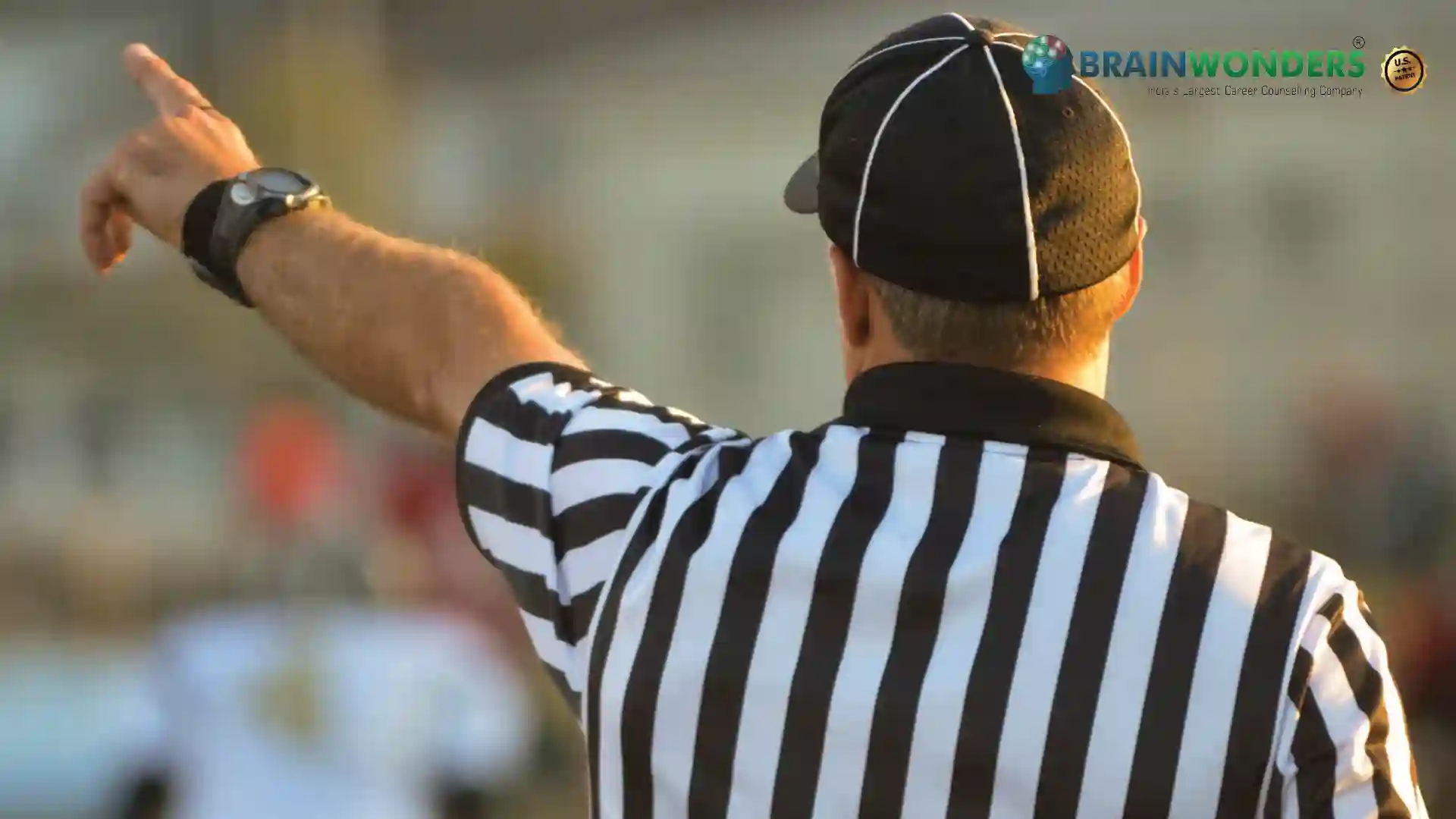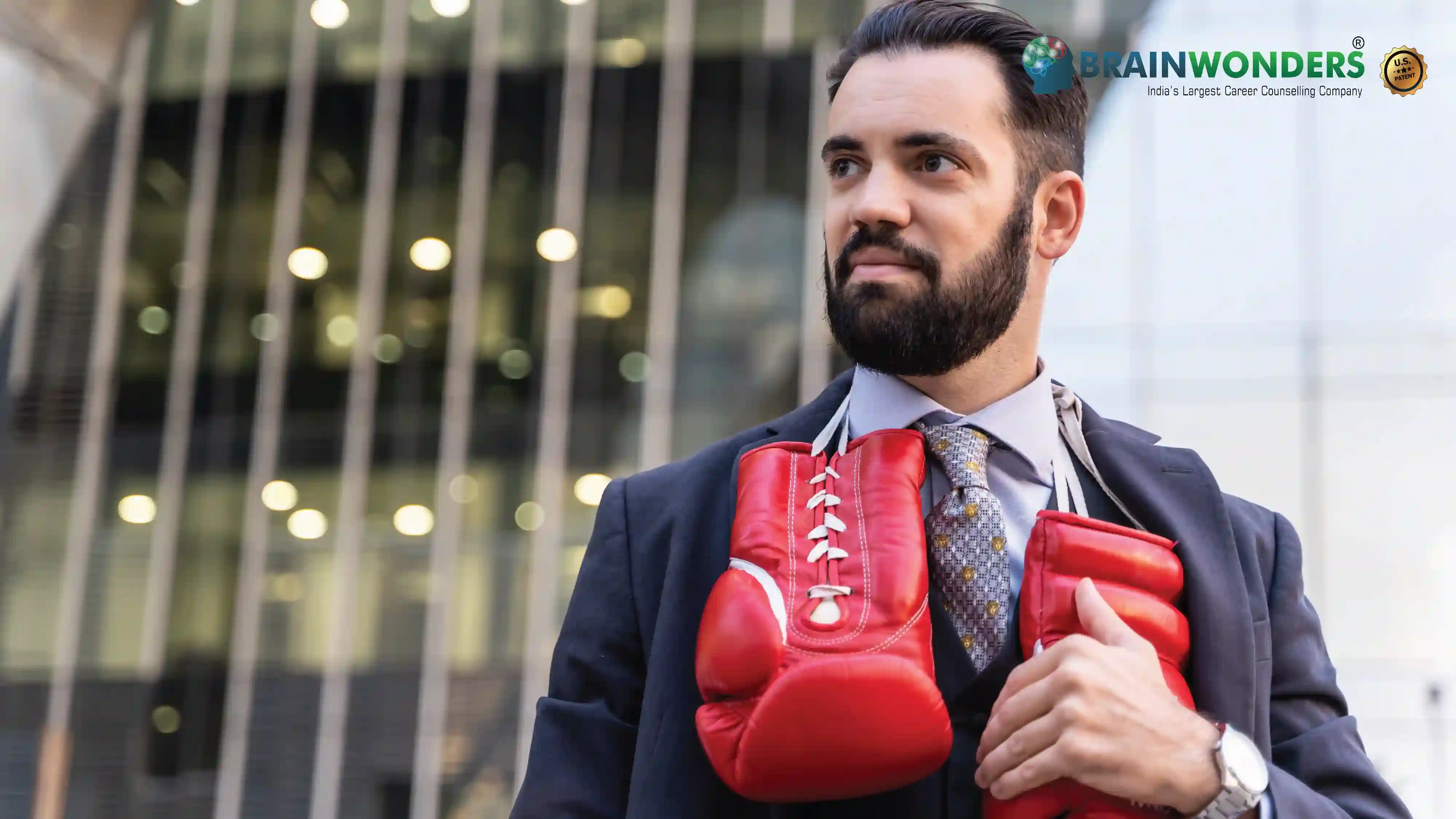How to become an Umpire, Referee, Sports Officer
Overview, Courses, Exam, Colleges, Pathways, Salary

Overview
Who is Umpire, Referee, Sports Officer ?
Umpires, referees, and other sports officials preside over competitive athletic or sporting events to help maintain standards of play. They detect infractions and decide penalties according to the rules of the game. They are responsible for ensuring that actions taken by participants are in compliance with standard rules and regulations of the game. While officiating at sporting events, umpires, referees, and other sports officials must anticipate play and position themselves where they can best see the action, assess the situation, and identify any violations of the rules. Some sports officials, such as boxing referees, may work independently. Others, such as baseball or softball umpires, work in groups. They might work for professional sports organizations, schools, or community sports organizations.
Typical day at work
What does Umpire, Referee, Sports Officer do?
- Officiate sporting events, games, and competitions
- Judge performances in sporting competitions to determine a winner
- Inspect sports equipment and examine all participants to ensure safety
- Keep track of event times, starting or stopping play when necessary
- Signal participants and other officials when infractions occur or to regulate play or competition
- Settle claims of infractions or complaints by participants
- Enforce the rules of the game and assess penalties when necessary
Abilities and Aptitude needed
What are the skills, abilities & aptitude needed to become Umpire, Referee, Sports Officer?
To become an umpire, referee, or sports officer, specific skills, abilities, and aptitudes are crucial for success in these roles. Here are some key attributes:
- Knowledge of the Sport: A deep understanding of the specific sport you wish to officiate or manage is essential. It includes knowledge of the rules, regulations, game mechanics, and current trends within the sport. Continuous learning and staying updated on rule changes are vital.
- Decision-Making: Umpires, referees, and sports officers must make quick and accurate decisions during fast-paced sporting events. The ability to analyze situations, assess player actions, and apply rules objectively is critical. An essential attribute is decisiveness, composure, and the confidence to enforce decisions impartially.
- Attention to Detail: Officiating and sports management require a keen eye for detail. Observing and accurately identifying infractions, violations, or rule compliance is crucial. Attention to detail helps ensure fairness and consistency in officiating decisions and maintaining the integrity of the game.
- Communication Skills: Effective communication is essential in conveying decisions, explaining rule interpretations, and managing interactions with players, coaches, and other officials. Clear verbal and non-verbal communication skills, including assertiveness and diplomacy, are essential for maintaining control and resolving conflicts.
- Physical Fitness and Stamina: Officiating sports events can be physically demanding. Umpires, referees, and sports officers need sufficient physical fitness and stamina to keep up with the pace of the game, maintain proper positioning on the field, and ensure accurate judgment throughout the match.
- Adaptability and Flexibility: Sports environments can be unpredictable, and situations may arise that require adaptability and quick thinking. Being able to handle unforeseen circumstances, adjust decisions, and maintain composure in high-pressure situations is crucial.
- Ethical Conduct and Integrity: Umpires, referees, and sports officers must exhibit the highest standards of ethical conduct and integrity. They are responsible for ensuring fair play, upholding the spirit of the game, and maintaining impartiality in their decisions.
- Teamwork and Collaboration: Officiating and sports management often involve working as part of a team. Collaborating with other officials, coaches, and administrators is necessary for coordinating game operations, resolving disputes, and ensuring a smooth sporting experience.
- Conflict Resolution: Effective conflict resolution skills are essential when dealing with disagreements, disputes, or challenging situations on the field. Being able to manage conflicts calmly, listen to different perspectives, and find resolutions that are fair and impartial is crucial.
- Professionalism and Leadership: Demonstrating professionalism, leadership, and the ability to command respect from players, coaches, and spectators is essential. Officiating and sports officers are role models and ambassadors for the sport they represent.
Pathways
How to become an Umpire, Referee, Sports Officer?
Entrance Exam
Entrance Exam for Umpire, Referee, Sports Officer ?
Courses
Which course I can pursue?
Best Colleges
Which are the best colleges to attend to become an Umpire, Referee, Sports Officer?
Industries
Which Industries are open for Umpire, Referee, Sports Officer?
Umpires, referees, and sports officers oversee sports events, ensure fair play, and manage sports-related operations. Here are some industries and sectors where these professionals can find opportunities:
- Professional Sports Leagues: Umpires and referees are integral to professional sports leagues, such as football, basketball, cricket, baseball, hockey, and more. They officiate games, enforce rules, make decisions on gameplay, and ensure fair competition.
- Collegiate Athletics: Colleges and universities employ umpires, referees, and sports officers to officiate sporting events within their athletic programs. These professionals help maintain the integrity of college sports and ensure compliance with league rules and regulations.
- Youth Sports Organizations: Local and regional youth sports organizations, including community leagues and school sports programs, often require umpires and referees to oversee matches and tournaments for various sports. These organizations focus on promoting youth participation and development in sports.
- International Sports Events: Umpires, referees, and sports officers have opportunities to officiate at international sports events, including significant tournaments, championships, and multi-sport events like the Olympics. These events require experienced officials knowledgeable about the specific sports' rules and regulations.
- Sports Associations and Federations: National and international sports associations and federations employ umpires and referees to officiate and manage events within their respective sports. These organizations set and enforce rules, conduct tournaments, and maintain officiating standards.
- Recreational and Amateur Sports Leagues: Recreational and amateur sports leagues, ranging from local community leagues to regional competitions, often rely on umpires, referees, and sports officers to officiate games and maintain fair play. These leagues provide opportunities for sports enthusiasts to participate and compete.
- Sports Facilities and Venues: Sports facilities, stadiums, and venues employ sports officers to oversee operations, manage events, coordinate logistics, and ensure the smooth functioning of sporting activities. They may work closely with event organizers, facility managers, and security teams.
- Sports Media and Broadcasting: Umpires and referees can contribute to sports media and broadcasting as analysts, commentators, or experts, providing insights and analysis on gameplay and officiating decisions. They may also contribute to rule interpretation and provide expert opinions during sports broadcasts.
- Sports Equipment and Apparel Companies: Umpires and referees may be employed by sports equipment and apparel companies in advisory roles or to provide expertise on sports rules and regulations. They may assist in product development, quality control, or customer support.
- Sports Officiating and Training Organizations: Officiating organizations and training institutes specialize in recruiting, training, and certifying umpires, referees, and sports officers. They provide education, certification, and ongoing professional development programs for officials in various sports.
internship
Are there internships available for Umpire, Referee, Sports Officer?
Internship opportunities tailored explicitly for umpires, referees, and sports officers may not be as common as in some other fields. However, there are avenues for aspiring officials and sports officers to gain practical experience and exposure. Here are a few potential sources for internships or similar opportunities:
- Sports Associations and Federations: National or regional sports associations and federations may offer internship programs for individuals interested in officiating or sports management. These programs can provide exposure to event organization, rule interpretation, and hands-on experience in officiating or managing sports events.
- Collegiate Athletics: Colleges and universities with athletic programs may offer internships or assistantships for aspiring officials or sports officers. These positions can involve assisting with game management, event coordination, rule enforcement, and gaining practical experience in collegiate sports.
- Local Sports Leagues and Organizations: Local sports leagues, community organizations, and youth sports programs often require assistance in officiating games and managing events. While not formal internships, volunteering or assisting with these organizations can provide valuable exposure to officiating and sports operations.
- Sports Facilities and Venues: Sports facilities, stadiums, and venues may offer internships or part-time positions related to sports operations and event management. These roles can involve assisting with scheduling and logistics and ensuring the smooth functioning of sporting activities.
- Sports Officiating and Training Organizations: Officiating organizations or training institutes may provide internship-like opportunities for individuals interested in becoming officials or sports officers. These programs can offer practical training, mentorship, and exposure to various aspects of sports officiating.
- Sports Media and Broadcasting: Sports media organizations or broadcasting companies may offer internships or entry-level positions for individuals interested in sports officiating or management. These positions can involve contributing to sports events' coverage, analysis, or production.
Career outlook
What does the future look like for Umpire, Referee, Sports Officer?
The employment of umpires, referees, and other sports officials is projected to grow 8 percent from 2019 to 2029, much faster than the average for all occupations. About 3,800 openings for umpires, referees, and other sports officials are projected each year, on average, over the decade. Job prospects are expected to be good at the youth and high school levels. As schools offer more athletic programs and as more students participate in sports, the demand for umpires, referees, and other sports officials may increase. However, competition is expected to be very strong for the collegiate and professional levels. Many people are attracted to work in sports, and the collegiate and professional levels typically have few job openings and low turnover.

.webp)
